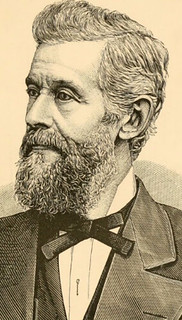
PREV ARTICLE
NEXT ARTICLE
FULL ISSUE
PREV FULL ISSUE
THINGS TO KNOW ABOUT SAMUEL UPHAM
John Philips of Virginia forwarded this Philadelphia Magazine article from March 24, 2017 about Sam Upham and his "souvenir" Confederate banknotes. Here's an excerpt - see the complete article online.
-Editor
To the Confederacy, he was a notorious counterfeiter. To the Union, he was a hero. Here, a few things you might not know about the Philly shopkeeper who helped win the Civil War.
2. In a flash of brilliance, Upham realized there would be a market for souvenir copies of the currency. He rushed to the Inquirer’s offices and bought the electroplate that had been used to print the facsimile, then took it to a printer and had him run off 3,000 copies. He hung a sign in his shop promoting them as “Rebel notes,” on sale for a penny apiece. They sold out within days. 3. Upham then procured the electroplate for a Confederate $10 bill that had appeared in another newspaper and had a quantity printed. He was careful to append to the bottom of each a notation that read: “Fac-simile Confederate Note—Sold wholesale and retail by S.C. Upham 403 Chestnut Street, Philadelphia.” 4. Conveniently, when this note was cut away, what was left was an exact replica of a Confederate $10 bill. This fact didn’t escape the notice of Northerners who were engaged in illegally smuggling cotton from the South for fabric manufacture. They soon began to pay for their cotton with Upham’s counterfeit bills. 5. Upham advertised his bills throughout the North, promoting them in newspapers that included the New York Tribune and Harper’s Weekly as “mementos of the Rebellion.” His ads also offered to pay “three times the value in gold” for other denominations of real Confederate bills and coins for him to duplicate. By May of 1862, he had a dozen different Confederate notes and stamps for offer and claimed to have sold 80,000 in April alone. His success led to a price increase: Notes now went for five cents each. He also added a caution to his advertising: BEWARE OF BASE IMITATIONS. 6. About this time, rather mysteriously, the notes, which had hitherto been printed on letter stock, began to appear on fine-quality banknote paper. Some people claim that the U.S. Secretary of War, Edwin M. Stanton, provided Upham with the paper after it was seized in a Union blockade. (Stanton is the man who, upon Abraham Lincoln’s assassination, famously declared, “Now he belongs to the ages.”) By summer, Upham’s counterfeits were superior in quality to the real thing.
Be sure to read the rest of the article about the man some said had "done more to injure the Confederate cause than General McClellan and his army." John also pointed out a great paper by Marc D. Weidenmier of the Department of Economics at Claremont McKenna College published in BUSINESS AND ECONOMIC HISTORY, Volume Twenty-eight, no. 2, Winter 1999. The title is Bogus Money Matters: Sam Upham and his Confederate Counterfeiting Business. Thanks. -Editor
To read the complete article, see:
The Numismatic Bibliomania Society is a non-profit organization promoting numismatic literature. See our web site at coinbooks.org. To submit items for publication in The E-Sylum, write to the Editor at this address: whomren@gmail.com To subscribe go to: https://my.binhost.com/lists/listinfo/esylum All Rights Reserved. NBS Home Page Contact the NBS webmaster 
|
